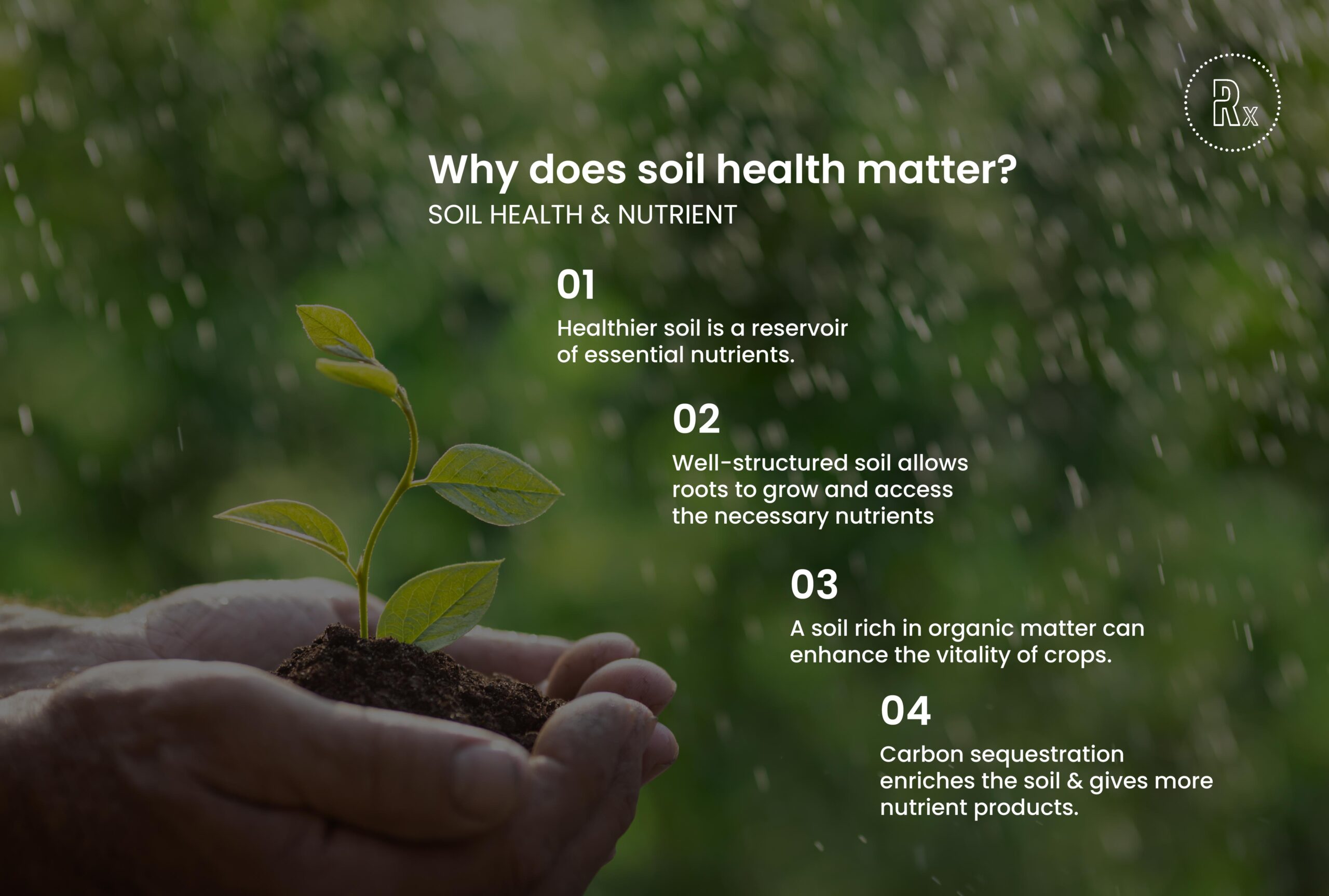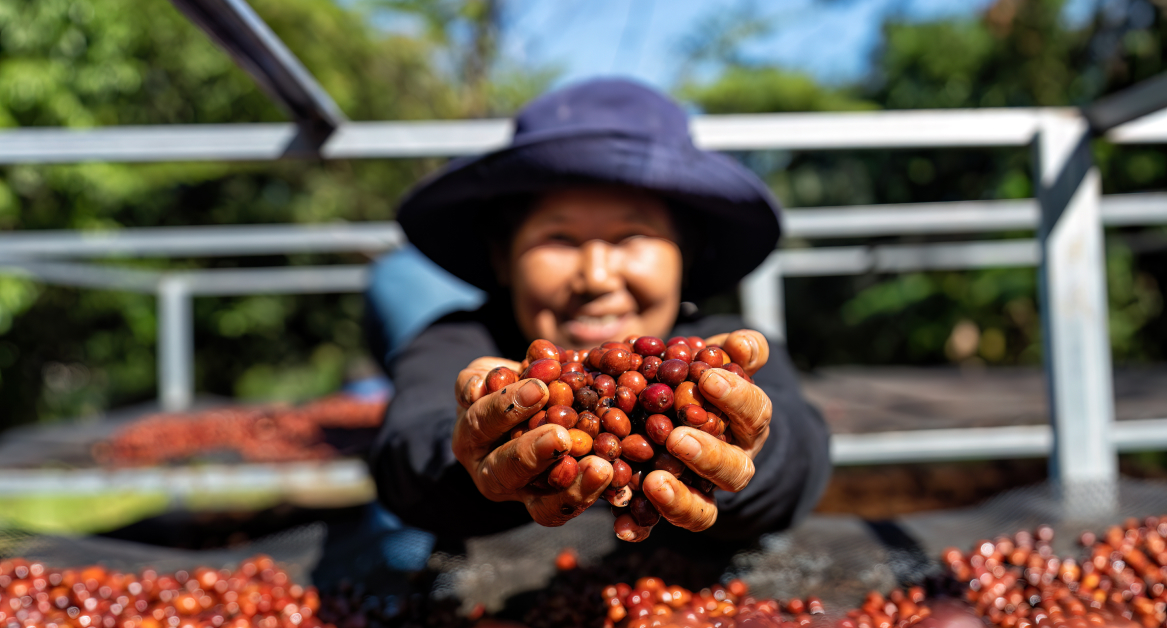If you’ve ever pondered, “Why should consumers care about soil health?”, you’re not alone. The answer stretches beyond farming fields to our plates, our health, and even our global climate.
Our planet’s well-being is intrinsically tied to the health of its soil. A thriving soil doesn’t just support plants; it plays a pivotal role in everything from the quality of the food we eat to the stabilization of our climate.
By understanding the profound impact of soil conditions, consumers can make well-informed choices that support both their well-being and that of the planet. On the other hand, businesses can make decisions on how to source their materials to enhance product quality as well as their consumers’ health.
The direct link: soil health and nutrient-dense food

At the heart of our food system lies the soil from which our crops emerge. It’s a living ecosystem teeming with organisms that play vital roles in nutrient cycling. However, not all soils are created equal.
- Foundation of nutrients: Healthier soil, enriched with organic matter and maintained through regenerative practices, becomes a reservoir of essential nutrients. This soil facilitates the growth of crops that are not only robust but also nutrient-dense.
- Soil structure and plant growth: The structure of soil determines its ability to hold air and water, both crucial for plant health. A well-structured soil ensures proper aeration and moisture levels, allowing plant roots to grow deeply and access the necessary nutrients. This directly translates to crops that are healthier and more nutritious.
- The magic of organic matter: Organic matter is the lifeblood of soil. It retains water, stores carbon, and provides essential nutrients to crops. By fostering a soil rich in organic matter, farmers enhance the vitality of their produce.
- Carbon sequestration and its benefits: Carbon sequestration is a natural process where soil captures and stores carbon from the atmosphere. This not only combats climate change but also enriches the soil, making it more fertile. Storing carbon in the ground translates to better crop growth and, in turn, nutrient-rich produce.
It’s clear that the health of our soil directly impacts the nutrient content of our food. Therefore, businesses and farms need to practice regenerative soil management which is the most effective technique to optimize solid health.
Safety and health considerations
When we think of food safety, we often consider external factors: how our food is processed, stored, or cooked. Yet, the health of the soil from which our food sprouts is an equally critical determinant of its safety.
- Natural defense against pests: A healthy soil is not just a nutrient reservoir; it’s a robust ecosystem. This biodiversity often acts as a natural barrier against pests and diseases. For instance, certain soil microbes can suppress harmful pathogens, minimizing the need for synthetic pesticides.
- Reduced need for chemical inputs: Pesticide residues on crops have long been a concern for many consumers. With healthier soil, farmers can often reduce or even eliminate the need for these chemicals. Such naturally-grown crops are not just better for the environment but also safer for consumption.
- Detoxification and filtering: One of the crucial roles of soil is its ability to detoxify and filter contaminants. Healthy soils, with their rich organic matter content, act as sponges, capturing and breaking down potential pollutants. This ensures that harmful substances don’t make their way into our food.
- Long-term health benefits: Consuming food grown in healthy soil might offer long-term health advantages. The enhanced nutrient profile, coupled with the reduction in pesticide residues, contributes to a diet that supports well-being and wards off potential health concerns.
Flavor and quality of products
Have you ever bitten into a tomato and marveled at its intense flavor? Or perhaps you’ve noticed the sweetness of a carrot freshly pulled from rich, loamy soil. The soil’s health can significantly influence the taste and overall quality of produce.
- Complex taste profiles: Healthy soils, rich in minerals and nurtured with organic practices like cover cropping, tend to produce crops with more complex and richer taste profiles. This isn’t just anecdotal; several studies suggest that soil quality can directly impact flavor.
- Texture and appearance: Beyond flavor, the texture and even color of produce can be influenced by soil health. Fruits and vegetables grown in vibrant soils often boast a more appealing texture and deeper, more vivid colors.
- Extended shelf life: Healthier crops tend to be more resilient post-harvest. This means that produce grown in nutrient-rich soil might have a longer shelf life, reducing food waste and ensuring consumers get the most out of every purchase.
We are what we eat, and what we eat grows from the soil. Prioritizing soil health ensures we’re not just consuming food, but savoring flavorful, high-quality produce that nourishes both body and soul.
Tackling climate change: A soil’s role
In an era where climate change weighs heavily on global discussions, the connection between soil health and our planet’s climate is increasingly significant. However, this connection is not always immediately apparent to the average consumer. Why should you, the person making everyday buying decisions, care about the role of soil in our global climate conundrum?
- The carbon storing champion: The term ‘carbon sequestration’ might sound technical, but its concept is beautifully simple. Healthy soils act as vast reserves, capturing and storing carbon from the atmosphere. In fact, soils are among the planet’s most formidable carbon sinks, second only to our oceans. This function plays a pivotal role in curbing greenhouse gas concentrations.
- Reducing harmful emissions: Conventional agriculture, with its heavy reliance on synthetic fertilizers and pesticides, contributes significantly to greenhouse gas emissions. By shifting to regenerative practices that prioritize soil health, these emissions can be dramatically reduced. And it’s not just about carbon; healthier soils can help decrease the emission of other potent greenhouse gases like nitrous oxide.
- Resilience against extreme weather: As our planet grapples with more frequent and intense weather events, healthy soils emerge as a key line of defense. They can absorb and retain more water during heavy downpours, reducing the risk of floods. Conversely, during droughts, these soils release stored water, supporting crop survival.
- Biodiversity and ecosystem support: A thriving soil is a living tapestry of microbes, fungi, insects, and countless other organisms. This biodiversity, fostered by practices like intercropping and agroforestry, has cascading benefits for the broader environment. Healthy ecosystems, in turn, play a vital role in stabilizing our climate.
By prioritizing soil health, we are directly supporting efforts to mitigate climate change. As consumers, every purchasing decision can be a step towards a cooler, more stable climate for future generations.
How consumers can make a difference
As consumers, we wield more power than we often realize. So, how can you champion soil health with your everyday choices?
- Educate and Inform: Knowledge is power. By understanding the importance of soil health, you’re already a step ahead. But don’t stop there:
- Support regenerative practices: Opt for products that prioritize soil health. Look for certifications or labels that indicate regenerative or sustainable practices. It’s not just about organic; it’s about supporting an entire ecosystem.
- Buy local: Local farms often employ practices that are kinder to the soil, simply because they have a direct relationship with the land they cultivate. By supporting them, you’re not just boosting local economies but also fostering sustainable agriculture.
- Demand transparency: As consumers, it’s within our rights to know where our food comes from and how it’s grown. By demanding transparency from suppliers and retailers, we can push for a food system that values soil health.
- Reduce waste: A significant portion of food ends up wasted, which is not only an economic loss but also a setback for soil health. By reducing waste, we ensure that the effort and resources that go into cultivation translate into nourishment.
In essence, caring for soil health is caring for ourselves and future generations. It’s a commitment to a more sustainable, equitable, and nourishing world.
And the best part? It all begins with small, everyday choices.



